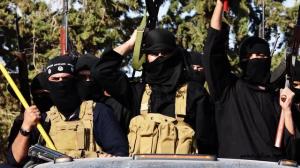Canada’s Role vs. ISIS
By Navid Hassibi, Wisam Salih
The Council on International Policy’s Navid Hassibi and Wisam Salih recently published a piece in Embassy News and in the Canadian International Council’s opencanada.org about Canada’s role in fighting the Islamic State of Iraq and Syria.
[commentary/analysis] As the United States, the United Kingdom, Australia, France and even Iran provide humanitarian and military assistance to Iraq in its fight against the Islamic State, Canada too has been supporting efforts to help Iraqis in their struggle against the Islamic militants. But opportunities exist for it to do more.
The Canadian government has pledged its support for the Iraqi people. It recently announced that it will be delivering weapons provided by allies to Kurdish forces battling the Islamic State (often still called by its old acronyms ISIS or ISIL) and will be sending $5 million in emergency supplies and humanitarian aid to Iraq.
Much of the aid will be distributed through three relief organizations including the International Red Cross, Mercy Corps and Save the Children Canada. Among other essential supplies, Canada’s aid package will include foodstuffs, medicine, blankets, tents and personal hygiene items. Canada will also reportedly assist in fixing water and sanitation facilities. Canada has sent more than $16 million so far this year to Iraq to help Syrians and Iraqis there.
To be sure, Canada’s humanitarian assistance to Iraq is a positive contribution and should be applauded; however, Ottawa can do more, for instance, in the area of refugee assistance.
Over the years, Canada has worked with the United Nations Refugee Agency by committing to resettling up to 20,000 Iraqi refugees in Canada by 2015. It had resettled more than 18,200 Iraqi refugees as of December 2013. The Iraqi pledge “represents the single largest resettlement commitment by Canada in over 25 years,” according to the Department of Foreign Affairs, Trade and Development.
In boosting its refugee assistance to Iraq, Canada can increase its intake of Iraqi refugees by many thousands more and must process their files quickly.
Canada should also consider upgrading the status of its mission in Baghdad, which is co-located in the British Embassy, to better coordinate Canadian refugee assistance to Iraqis. In doing so, Ottawa can also relocate its ambassador to Iraq from Amman, Jordan to Baghdad, where he and the mission can oversee the bilateral relationship at the strategic level and engage with the central government to push for national unity, much like Canada’s major allies are doing.
Indeed, Canada is well positioned amongst Western allies to push for national unity in Iraq by insisting that military assistance not only be provided to Peshmerga (Kurdish) forces, but also equally to the Iraqi military once a new government is formed in Baghdad by prime minister-designate Haider al-Abadi. This will work to support the unity of Iraq vis-à-vis calls for Kurdish independence, which the West has been reluctant to support.
In the interest of regional stability
Pushing for the Iraqi military to continue to work with Kurdish forces will build a sense of national unity at a time of deteriorating relations between Baghdad and Erbil under Iraq’s outgoing prime minister, Nouri al-Maliki. In the interest of regional stability, Iraqi forces must be able to not only secure their own borders, but also provide basic security to Iraqi citizens. Perhaps this will also work to “grease the wheels” between Erbil and Baghdad on outstanding thorny issues, such as oil revenues, unpaid wages and Kurdish representation in Baghdad.
Given Canada’s strong diplomatic relationship with regional countries, Ottawa can do more to pressure petro-monarchies, such as Saudi Arabia, Kuwait and Qatar, to not only curb the export of religious extremism to disenfranchised Sunni Muslim communities across the broader Middle East and North Africa, but also to prevent the flow of funds to purchase weapons for regional conflicts, such as in Iraq and Syria. By preventing such flows, which have proliferated dramatically since the beginning of the Syrian civil war, terrorist groups will find it difficult to maintain their presence in these conflicts.
In following sanctions by the United Nations and United States against the Islamic State, Canada can impose its own set of sanctions on the extremist group. In identifying key members of the Islamic State, Canada must work to ensure that these foreign fighters do not threaten the Canadian homeland by travelling or returning to Canada. In testimony to the Senate national security and defence committee in February, the director of the Canadian Security Intelligence Service revealed that 130 Canadians had gone overseas to fight in places like Yemen, Somalia and North Africa. That number included 30 individuals who have fought in Syria (and potentially Iraq). At issue is not simply that these volunteers are joining foreign militias but also the threat they pose to Canada upon their return.
Even if Western and Iraqi efforts to fight the Islamic State are successful, religious extremism in Iraq will undoubtedly remain a security threat for the region and the international community at large. As such, once conditions in Iraq stabilize, Canada can build linkages with Iraqi students and intellectuals by boosting the number of academic and cultural exchanges and student visas offered to Iraqi students.
In the long term, such exchanges will help rehabilitate the Iraqi people into the international community, after decades of isolation, military conflict and authoritarian dictatorship. Given large Iraqi expatriate communities in Canada, providing such opportunities in the short term will pay dividends by building a long-term diplomatic relationship and affinity between the Canadian and Iraqi people.
Needless to say, Canada’s role in the conflict against the Islamic State has thus far been commendable, but Ottawa can do more.
This article was originally published in Embassy News and was re-published on opencanada.org. The views here represent the authors’ own.
Related posts:
Category: FOREIGN POLICY & SECURITY, MIDDLE EAST & NORTH AFRICA


